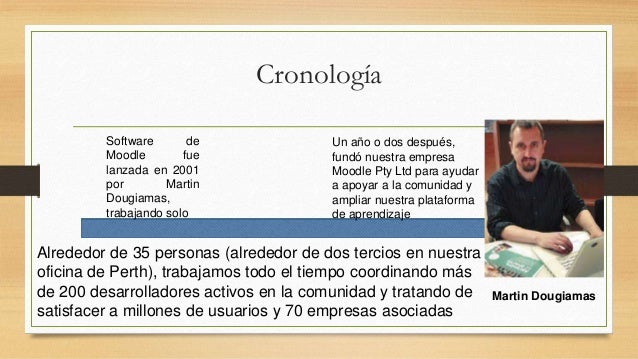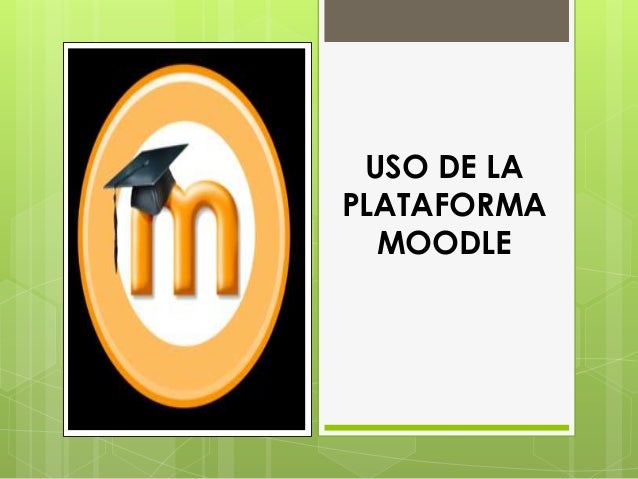Historia De La Plataforma Moodle
Oct 6, 2015 - By submitting your contact information, you consent to receive communication from Prezi containing information on Prezi's products.
Free Moodle
Contents.Overview Moodle was originally developed by to help educators create online courses with a focus on interaction and collaborative construction of content, and it is in continual evolution. The first version of Moodle was released on 20 August 2002. Nowadays the Moodle Project is led and coordinated by Moodle HQ, an Australian company of 50 developers which is financially supported by a network of eighty-four Moodle Partner service companies worldwide. Moodle's development has also been assisted by the work of open-source programmers.Moodle as a learning platform can enhance existing learning environments. As an tool, Moodle has a wide range of standard and innovative features such as a calendar and a Gradebook. Moodle is a leading and can be used in many types of environments such as education, training and development and in settings.
Plugins Plugins are a flexible tool set, allowing Moodle users to extend the features of the site. There are hundreds of plugins for Moodle, extending the features of Moodle's core functionality.
Each plugin is maintained in the Moodle plugins directory. As of June 2017, there are 1,342 plugins available for Moodle with over 405,200 recent downloads.
Themes Graphical themes for Moodle can be installed to change the look and functionality of a Moodle site or of an individual course.Mobile Many Moodle themes, based on, allow Moodle to be used on. Also, a Moodle is available in, and the.E-learning standards support Moodle has adopted the following e-learning standards:. is a collection of E-learning standards and specifications that define communications between client side content and a server side learning management system, as well as how externally authored content should be packaged in order to integrate with the LMS effectively. There are two versions: SCORM 1.2 and SCORM 2004. Moodle is SCORM 1.2 compliant, and passes all the tests in the ADL Conformance test suite 1.2.7 for SCORM 1.2. SCORM 2004 is not supported in Moodle, however Rustici Software have a Moodle plugin which can turn any Moodle site into a fully compliant SCORM 2004 LMS.
The AICC HACP standard for CMI was developed by the and is used to call externally authored content and assessment packages. AICC content packages are supported in Moodle 2.1 and later versions.

Common Cartridge packages can also be imported into Moodle. In addition, Moodle Book activities can be exported as IMS Content Packages.
(LTI) is a standard way of integrating rich learning applications (often remotely hosted and provided through third-party services) with educational platforms. Moodle uses the External Tool activity to act as an 'LTI consumer' as standard, and will act as an 'LTI provider' using a plugin.Deployment Users can download and install Moodle on a, such as, and a number of database management systems, such as, are supported. Pre-built combinations of Moodle with a Web server and database are available for. Other automated installation approaches exist, such as installing a package, deploying a ready-to-use Moodle appliance, using the installer, or using a 'one-click install' service such as.Certified Moodle Partners provide other Moodle services, including hosting, training, customization and content development.
This network of providers support development of the Moodle project through royalties. Interoperability Moodle runs without modification on, and any other systems that support and a database, including webhost providers.Moodle also has import features for use with other specific systems, such as importing quizzes or entire courses from or WebCT. As of February 2010, Moodle will not import Blackboard courses, apparently due to changes in php code-releases.In March 2012 Blackboard acquired two companies based on Moodle's software including Baltimore-based Inc. And NetSpot of Adelaide, Australia.
In August 2015, Blackboard acquired Colombia-based Nivel7, possibly the largest Moodle services provider in Latin America. The site, Opensource.com, reports that Moodle will always be an project, with clear delineation between Blackboard and Moodle. Background Origins , who has graduate degrees in and, wrote the first version of Moodle. Dougiamas started a to examine 'the use of to support a of teaching and learning within Internet-based communities of reflective inquiry.' Although how exactly social constructionism makes Moodle different from other eLearning platforms is difficult to show, it has been cited as an important factor by Moodle adopters. Other Moodle adopters, such as the in the UK, have pointed out that Learning Management Systems can equally be seen as 'relatively pedagogy-neutral'. Pedagogical approach The stated philosophy of Moodle includes a and approach to education, emphasizing that learners (and not just teachers) can contribute to the educational experience.
Using these principles, Moodle provides an environment for learning communities. Origin of name The acronym Moodle stands for modular object-oriented dynamic learning environment. (In the early years the 'm' stood for 'Martin's', named after Martin Dougiamas, the original developer). As well as being an acronym, the name was chosen because of the dictionary definition of Moodle and to correspond to an available domain name. Development Moodle has continued to evolve since 1999 (since 2001 with the current architecture). It has been translated into over 100 different languages and is accessible in many countries worldwide.
Institutions can add as many Moodle servers as needed without having to pay license fees. The of the UK currently uses a Moodle installation for their 200,000 users while the UK government uses a Moodle installation for their Civil Service Learning platform serving half a million employees. Moodle conferences A MoodleMoot is a conference for Moodle community members, held to learn about Moodle, share experiences of the learning platform, discuss research in related educational technologies and contribute ideas to future Moodle development. Held around the world, MoodleMoots are organised by universities or other large organisations using Moodle, Moodle Partners, Moodle associations or Moodle HQ.Adoption In the higher education market in the United States, Moodle was for a time the second largest provider with 23% in 2013 (following (41%), (11%), and ). However, by 2017 Moodle had dropped to the third largest provider, due in part to increased adoption of Instructure's Canvas platform.
In March 2016 Blackboard became an official Moodle partner. See also. ^. Rogers, Patricia L. 8 September 2014. Costello, Eamon (1 November 2013).
'Opening up to open source: looking at how Moodle was adopted in higher education'. Open Learning: The Journal of Open, Distance and E-Learning. 28 (3): 187–200. Krassa, Anna (4 October 2013). 2nd Moodle Research Conference (MRC2013). Sousse, Tunisia.
Pp. 84–93. Horvat, Ana; Dobrota, M.; Krsmanovic, M.; & Cudanov, M. 'Student perception of Moodle learning management system: a satisfaction and significance analysis'. Interactive Learning Environments. 23 (4): 515–527. Gavin W.
Porter (7 June 2013). 'Free choice of learning management systems: Do student habits override inherent system quality?'
Interactive Tech & Smart ed. 10 (2): 84–94. Retrieved 2018-04-18. Adam Stanley, The Globe and Mail. Jordan, Sally (2013). New Directions.
9 (1): 87–106. 19 November 2014. UCISA Richard Walker, Julie Voce, Joe Nicholls, Elaine Swift, Jebar Ahmed, Sarah Horrigan and Phil Vincent. 31 December 2015.: Information Technology Unit (itu). Retrieved 2011-03-01.
Moodle is a well-known e-learning platform in tertiary institutions. Download gta liberty city for psp. Many universities and colleges use Moodle as the online learning system in their daily teaching and learning. Moodle is a free open source software it means developer can make modification based on their needs. CPCE decides to use Moodle as a e-learning platform for HKCC and SPEED from 2009/10 academic year onwards.
Retrieved 2017-06-01. August 13, 2015. Opensource.com. Weller, M. 'VLE 2.0 and future directions in learning environments'.


Proceedings of the first LAMS Conference, Sydney. McMulli & Munroe (2004). Sclater, Neil (2008). Moodle.org Lounge. Kehrer, Anika.
Marsden, Dan (2 April 2012). Retrieved 27 May 2013. (PDF), CampusComputing, 2013. Retrieved 22 November 2017. Retrieved 2018-04-18.External links.